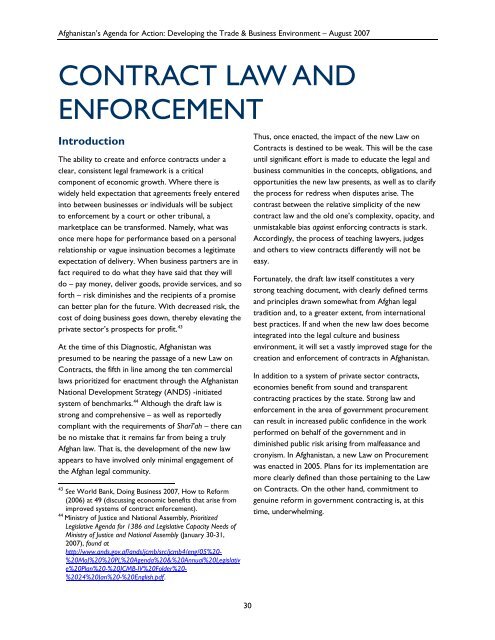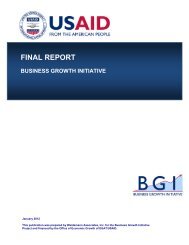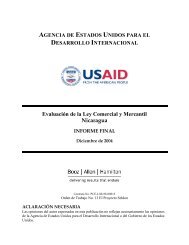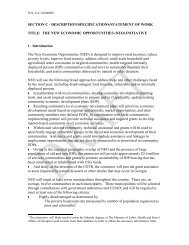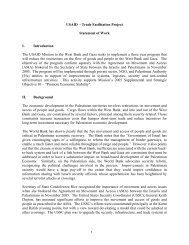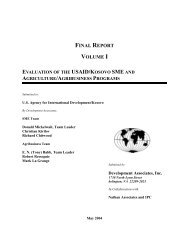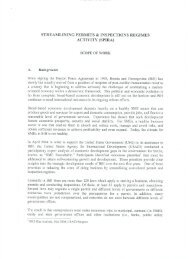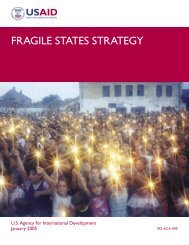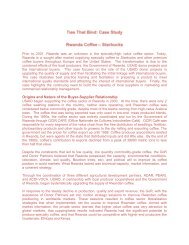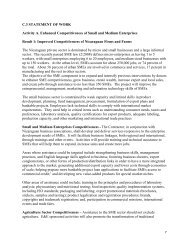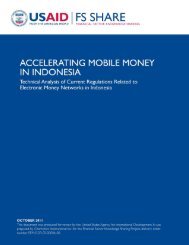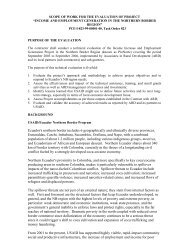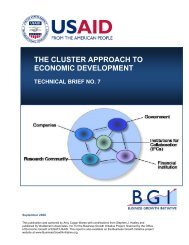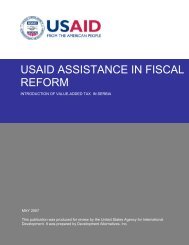Afghanistan's Agenda for Action - Economic Growth - usaid
Afghanistan's Agenda for Action - Economic Growth - usaid
Afghanistan's Agenda for Action - Economic Growth - usaid
Create successful ePaper yourself
Turn your PDF publications into a flip-book with our unique Google optimized e-Paper software.
Afghanistan’s <strong>Agenda</strong> <strong>for</strong> <strong>Action</strong>: Developing the Trade & Business Environment – August 2007CONTRACT LAW ANDENFORCEMENTIntroductionThe ability to create and en<strong>for</strong>ce contracts under aclear, consistent legal framework is a criticalcomponent of economic growth. Where there iswidely held expectation that agreements freely enteredinto between businesses or individuals will be subjectto en<strong>for</strong>cement by a court or other tribunal, amarketplace can be trans<strong>for</strong>med. Namely, what wasonce mere hope <strong>for</strong> per<strong>for</strong>mance based on a personalrelationship or vague insinuation becomes a legitimateexpectation of delivery. When business partners are infact required to do what they have said that they willdo – pay money, deliver goods, provide services, and so<strong>for</strong>th – risk diminishes and the recipients of a promisecan better plan <strong>for</strong> the future. With decreased risk, thecost of doing business goes down, thereby elevating theprivate sector’s prospects <strong>for</strong> profit. 43At the time of this Diagnostic, Afghanistan waspresumed to be nearing the passage of a new Law onContracts, the fifth in line among the ten commerciallaws prioritized <strong>for</strong> enactment through the AfghanistanNational Development Strategy (ANDS) -initiatedsystem of benchmarks. 44 Although the draft law isstrong and comprehensive – as well as reportedlycompliant with the requirements of Sharī’ah – there canbe no mistake that it remains far from being a trulyAfghan law. That is, the development of the new lawappears to have involved only minimal engagement ofthe Afghan legal community.43 See World Bank, Doing Business 2007, How to Re<strong>for</strong>m(2006) at 49 (discussing economic benefits that arise fromimproved systems of contract en<strong>for</strong>cement).44Ministry of Justice and National Assembly, PrioritizedLegislative <strong>Agenda</strong> <strong>for</strong> 1386 and Legislative Capacity Needs ofMinistry of Justice and National Assembly (January 30-31,2007), found athttp://www.ands.gov.af/ands/jcmb/src/jcmb4/eng/05%20-%20MoJ%20%20PL%20<strong>Agenda</strong>%20&%20Annual%20Legislative%20Plan%20-%20JCMB-IV%20Folder%20-%2024%20Jan%20-%20English.pdf.Thus, once enacted, the impact of the new Law onContracts is destined to be weak. This will be the caseuntil significant ef<strong>for</strong>t is made to educate the legal andbusiness communities in the concepts, obligations, andopportunities the new law presents, as well as to clarifythe process <strong>for</strong> redress when disputes arise. Thecontrast between the relative simplicity of the newcontract law and the old one’s complexity, opacity, andunmistakable bias against en<strong>for</strong>cing contracts is stark.Accordingly, the process of teaching lawyers, judgesand others to view contracts differently will not beeasy.Fortunately, the draft law itself constitutes a verystrong teaching document, with clearly defined termsand principles drawn somewhat from Afghan legaltradition and, to a greater extent, from internationalbest practices. If and when the new law does becomeintegrated into the legal culture and businessenvironment, it will set a vastly improved stage <strong>for</strong> thecreation and en<strong>for</strong>cement of contracts in Afghanistan.In addition to a system of private sector contracts,economies benefit from sound and transparentcontracting practices by the state. Strong law anden<strong>for</strong>cement in the area of government procurementcan result in increased public confidence in the workper<strong>for</strong>med on behalf of the government and indiminished public risk arising from malfeasance andcronyism. In Afghanistan, a new Law on Procurementwas enacted in 2005. Plans <strong>for</strong> its implementation aremore clearly defined than those pertaining to the Lawon Contracts. On the other hand, commitment togenuine re<strong>for</strong>m in government contracting is, at thistime, underwhelming.30


